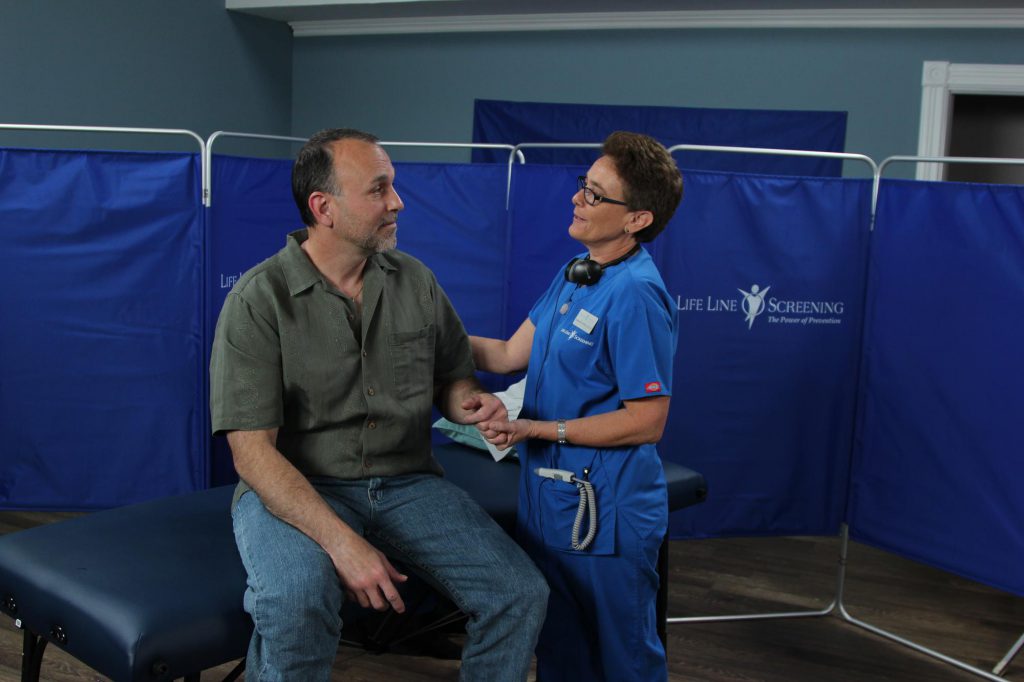
Cancer Screening
Our cancer screening tests’ descriptions will help you understand what we look for and what you can do with the results of these cancer tests. Cancer screenings can be an early warning that tells you something may be wrong and needs to be investigated further. As with all screenings, follow-up with your doctor is important.

Prostate Cancer Test
Prostate cancer screening is a measurement of prostate-specific antigen (PSA) in the blood. PSA is a protein produced by normal as well as malignant (cancer) cells of the prostate gland, and is often elevated in men with prostate cancer. This is why the cancer screening measures the amount of PSA to see if it is too high. You should discuss the benefits of PSA cancer screenings with your doctor and do what feels right to you. Cancer screenings and the diagnostic tests that may follow have both risks and benefits so make sure you feel informed.1
The general guidelines for this cancer screening test are:
- Men ages 50-69 who are at average risk for prostate cancer
- Men ages 45-50 who are at higher risk for prostate cancer either because they are African-American or have a father, brother, or son diagnosed with prostate cancer before age 65
- Men who are 40+ years old with several first-degree relatives (father, brothers and/or sons) with prostate cancer. This is the highest risk group and the group that would most benefit from a prostate cancer screening.
Prostate cancer is one of the most common types of cancer in men, but early detection through cancer testing (while it is still confined to the prostate gland) can increase the chances for successful treatment.

Colorectal Cancer Screening
Colorectal cancer is the third leading cause of cancer-related deaths in men and women in the U.S., but it has been declining because more people are taking charge of their health with colon cancer testing. Colon cancer often develops from polyps in the colon, and earlier screening means these polyps can be removed before they develop into cancer.
The Life Line Screening colorectal cancer screening is a simple, convenient, take-home kit that can be conducted in the privacy of your home. Simply collect your sample using the clear directions provided, mail your sample in to the certified lab, and results will be returned to you directly. The cancer screening detects blood in your stool, which can often indicate cancer. A positive result on this cancer test means you should follow up with your physician as soon as possible. Other cancer screening tests may follow such as a sigmoidoscopy, a colonoscopy, or a series of x-rays that show the entire colon and rectum.2
Colon cancer can be treated successfully, but the earlier it is detected, the better the potential outcome. This is the reason for offering cancer screening tests, to identify concerns at an earlier stage when they have the best chance of being treated. Every adult 50+ should take this test.

Annual Key Health (AKH)
The Annual Key Health (AKH) Assessment is a comprehensive screening that, combined with your vascular screening results, provides a deeper look into your risk for heart disease, stroke, and other chronic conditions. This screening is our most popular blood screening package because of the powerful information received.
Beginning with the 6 For Life, the AKH uses blood analysis, biometrics, and a proprietary algorithm to predict your risk of developing 6 chronic conditions: Heart disease, stroke, congestive heart failure, diabetes, Chronic Obstructive Pulmonary Disease (COPD), and lung cancer. The results report points out exactly what is putting you at risk of these diseases and what you can do to reduce your risk before they develop. The AKH also provides a High-Sensitivity C-Reactive Protein (hs-CRP) measurement. C-Reactive protein is released into the bloodstream when there is inflammation in the body. Because plaque buildup in the arteries actually damages the arteries, inflammation occurs, and this protein is released into the bloodstream. New research indicates that high sensitivity C-Reactive Protein is a reliable indicator for risk of cardiovascular disease, and is a key screening in understanding your overall risk for heart disease.

Wellness Panels
Because many people want a comprehensive blood screening for a more complete look at their health, we have developed Wellness Panels to bundle key tests and save you money:
- Wellness Panel Premium-Men: Contains glucose screening, C-reactive protein, and prostate-specific antigen (PSA), a cancer screening test.
- Wellness Panel Premium PLUS-Men: Measures kidney function, C-reactive protein, glucose, thyroid function, prostate-specific antigen (PSA, a cancer screening), and testosterone
- Wellness Panel-Women: Contains C-Reactive Protein screening, Hemoglobin A1c testing, and a test for thyroid function.
- Wellness Panel Plus-Women: Measures kidney function, C-Reactive protein, Hemoglobin A1c, and a thyroid function.
We encourage all Life Line Screening participants to share your results report with your personal physician. Based on your ultrasound, ECG, blood results, and your medical history, you and your doctor can determine a plan of action to maintain your health and independence as long as possible. Do it for you and your family!

Prostate and Testosterone-Men
This screening combines the prostate-specific antigen (PSA) cancer screening described above with a screening for testosterone level in the blood. Testosterone is a hormone produced by the testicles, and is responsible for traits such as body hair, muscle mass, and strength. Testosterone levels naturally decrease with age beginning at age 40, or with illness. This is normal and not considered a problem. The most common testosterone related condition is called hypogonadism, which is another name for low testosterone. A man with hypogonadism may have erectile dysfunction, difficulty conceiving a child, decreased sex drive, and overall tiredness. Sometimes this is also called Low-T.3
Please note: There are other cancer screening tests that Life Line Screening does not provide. Please consult with your doctor about breast cancer and cervical cancer screenings, and lung cancer screening with a special x-ray for people who have had a history of heavy smoking or who smoke now, and are between the ages of 55-80.4